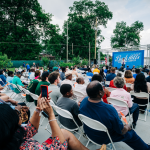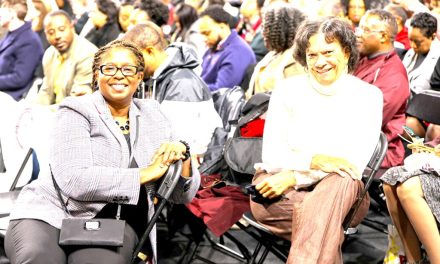
By Mark Gray
(Zenger News) – At a time when the perception of football coaching at Historically Black Colleges and Universities is being defined by the personality of Deion “Coach Prime” Sanders at Jackson State, Bowie State’s Damon Wilson is a throwback.
Wilson’s path to what has become legendary status at his alma mater has not been easy. But he has helped transform a program that was an also-ran when he played there in the late 1980s into a nationally ranked power in the NCAA Division II.
“It was a process,” said Wilson. “When I transferred from junior college, and several teammates had a vision for this kind of success. We had only two years to impact the program as players and had some success, but once I graduated we were able to join the staff and help begin the process of moving things forward.”
Wilson was named 2021 American Football Coaches Association Division II Coach of the Year after leading the Bulldogs to their third consecutive Central Intercollegiate Athletic Association (CIAA) championship and a deep run in the NCAA Division II playoffs.
Bowie State (10–2) advanced to the national quarterfinals for the first time in school history, the furthest an HBCU had been in the CIAA program since Winston Salem State won the national championship in 2012 and 2011.
“This particular award means a lot,” said Wilson. “There have been very few minorities to receive this accomplishment. When I learned I had won the award, it was almost surreal when you consider some of the legends like Eddie Robinson who never received an honor like this.
“As a coach at the Division II level, there are things you want to accomplish and this is one of those things.”
Wilson is something of an anomaly these days as many HBCU programs hire big-name former National Football League players as coaches to establish immediate credibility and hopefully expedite their move into championship caliber status — as Jackson State did with former NFL star Sanders.
Another option for many next-generation athletic administrators is hiring position coaches or coordinators from Division I Power 5 conference schools. Some HBCU programs are led by athletic directors with backgrounds at major college programs that have bypassed those who rise through the ranks of student-athlete, to position coach, to coordinator yet aren’t deemed qualified for head coaching jobs.
Often HBCU programs are professional pit stops on the road to major college opportunities. But Wilson has taken a more circuitous route to earn his place among elite coaches nationwide, and he recognizes the uphill battle those on his staff will face moving forward. Most of the coaches in the Bowie State program were former players under Wilson’s watch, and he hopes to continue to develop his own minority coaching tree, in addition to competing for championships.
“I don’t want any young coach to be concerned or discouraged about how to move forward in this profession,” said Wilson. “This is a cycle that we’re going through right now. I don’t look at HBCU as a different brand of football. It’s still college football, but the HBCU experience is different.”
One of the major differences is the resources, or lack thereof, that Wilson and most HBCU Division II coaches face. They have been notoriously underfunded. NCAA rules allow D-II programs to provide only 36 scholarships. Bowie State offers 18 in the best of financial times. This means the university misses the chance to sign many players from a talented recruiting base in the area and the opportunity to land transfer students who could make a difference.
‘A thinker and a great communicator’
“Damon is a thorough thinker and a great communicator, which has served him well on the field and off,” said Clyde Doughty, Bowie State’s vice president of intercollegiate athletics and recreation. “He comes in with a game plan that is strategic in his approach to development.”
Wilson learned as an understudy to former coach and mentor Henry Frazier III, a former Bowie State quarterback who was the head football coach at the university from 1999 to 2003. Frazier was the first coach to lead the program to a CIAA east division championship in 2002. His blueprint was to build a staff of former players and coach them to help young African American men grow into leaders off the field.
Frazier was also the architect of the first Southwest Athletic Conference (SWAC) championship in 2009 at Prairie View A&M, which lost 80 consecutive games between 1989–1998.
Frazier, now a part of Mike Locksley’s staff at the University of Maryland, said of Wilson: “He’s an old soul and a very humble man. This guy is a student of the game who soaks up knowledge like a sponge. There’s a formula for success at Bowie and once he figured it out, he stayed.
“This was never a pit stop for Damon. He loves Bowie State.”
In the aftermath of this historic season, Wilson has his eyes on the future. He is collaborating with Doughty to reach the financial goals that will help the program win a national championship. Though significant improvements have been made to the university’s football stadium, Wilson is one of the leaders of a fundraising campaign to build a new one.
He has started an endowment at Bowie State, one of the first steps he hopes will help keep the football team among the elite Division II in the quest for another national championship.
Over the past five years, Bowie State’s reputation nationally has grown in Division II circles. With three consecutive CIAA football championships, a run to the NCAA quarterfinals, and the AFCA Coach of the Year award, the Bulldogs are no longer the best kept secret in the division.
However, Wilson said, “We aren’t going to be satisfied with just being a dominant HBCU program that is good with winning conference championships and making deep runs in the playoffs anymore.
“We’re competing to win a national championship.”
Edited by Judith Isacoff and Kristen Butler
Help us Continue to tell OUR Story and join the AFRO family as a member – subscribers are now members! Join here!
The post Bowie State’s Damon Wilson named AFCA Division II National Coach of the Year appeared first on AFRO American Newspapers .











